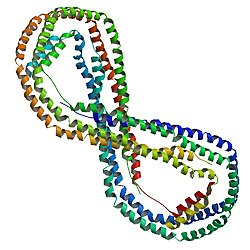Apolipoprotéine A1
L'apolipoproteine A1 est une protéine de type apolipoprotéine, fabriquée par les intestins et le foie et entrant dans la constitution à 60 % dans les particules de HDL et à 12 pour cent dans les chylomicrons. Le rôle de cette molécule est d'activer la LCAT. Son gène est APOA1 situé sur le chromosome 11 humain.
Rôles[modifier | modifier le code]
La protéine subit une chlorination et une nitration par la myéloperoxydase ce qui modifie son action avec l'ABCA1[5].
En médecine[modifier | modifier le code]
Un anticorps dirigé contre l'apolipoprotéine A1 est retrouvé dans différentes circonstances, comme dans la polyarthrite rhumatoïde[6] ou lors d'un lupus érythémateux disséminé[7], ou aussi, au décours d'un syndrome coronarien aigu[8], semblant dans ce cas un marqueur de mauvais pronostic[9]. Ils sont également présents dans 20 % de la population générale et pourrait constituer un marqueur de risque cardio-vasculaire[10], possiblement en fragilisant la plaque d'athérome[11]. Ce caractère péjoratif n'est cependant pas retrouvé dans d'autres études[12].
Il existe plusieurs variants entraînant des conformations protéiques différentes, avec, dans certains cas, une accumulation dans certains tissus[13] entraînant une amylose. D'autres variants sont corrélés avec un risque augmenté de survenue de maladies cardio-vasculaires[14].
Notes et références[modifier | modifier le code]
- GRCh38: Ensembl release 89: ENSG00000118137 - Ensembl, May 2017
- GRCm38: Ensembl release 89: ENSMUSG00000032083 - Ensembl, May 2017
- « Publications PubMed pour l'Homme », sur National Center for Biotechnology Information, U.S. National Library of Medicine
- « Publications PubMed pour la Souris », sur National Center for Biotechnology Information, U.S. National Library of Medicine
- Shao B, Bergt C, Fu X et al. Tyrosine 192 in apolipoprotein A‐I is the major site of nitration and chlorination by myeloperoxidase, but only chlorination markedly impairs ABCA1‐dependent cholesterol transport, J Biol Chem, 2005;280:5983–93
- Vuilleumier N, Bratt J, Alizadeh R, Jogestrand T, Hafstrom I, Frostegard J, Anti‐apoA‐1 IgG and oxidized LDL are raised in rheumatoid arthritis (RA): potential associations with cardiovascular disease and RA disease activity, Scand J Rheumatol, 2010;39:447–53
- Batuca JR, Ames PR, Amaral M, Favas C, Isenberg DA, Delgado Alves J, Anti‐atherogenic and anti‐inflammatory properties of high‐density lipoprotein are affected by specific antibodies in systemic lupus erythematosus, Rheumatology, 2009;48:26–31
- Vuilleumier N, Charbonney E, Fontao L et al. Anti‐(apolipoprotein A‐1) IgGs are associated with high levels of oxidized low‐density lipoprotein in acute coronary syndrome, Clin Sci, 2008;115:25–33
- Vuilleumier N, Rossier MF, Pagano S et al. Anti‐apolipoprotein A‐1 IgG as an independent cardiovascular prognostic marker affecting basal heart rate in myocardial infarction, Eur Heart J, 2010;31:815–23
- Antiochos P, Marques‐Vidal P, Virzi J et al. Association between anti‐apolipoprotein A‐1 antibodies and cardiovascular disease in the general population. Results from the CoLaus study, Thromb Haemost, 2016;116:764–71
- Montecucco F, Vuilleumier N, Pagano S et al. Anti‐Apolipoprotein A‐1 auto‐antibodies are active mediators of atherosclerotic plaque vulnerability, Eur Heart J, 2011;32:412–21
- Lagerstedt JO, Dalla‐Riva J, Marinkovic G et al. Anti‐ApoA‐I IgG antibodies are not associated with carotid artery disease progression and first‐time cardiovascular events in middle‐aged individuals, J Intern Med, 2018;285:49-58
- Petrlova J, Duong T, Cochran MC et al. The fibrillogenic L178H variant of apolipoprotein A‐I forms helical fibrils, J Lipid Res, 2012;53:390–8
- Haase CL, Frikke‐Schmidt R, Nordestgaard BG et al. Mutation in APOA1 predicts increased risk of ischaemic heart disease and total mortality without low HDL cholesterol levels, J Intern Med, 2011;270:136–46







